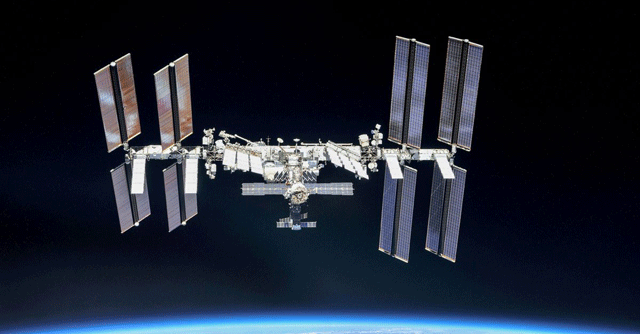
Ukraine war: Russia’s space threats put satellite internet, ISS at stake


The Ukraine-Russia conflict has had a domino effect on the private space industry, exposing how numerous critical aspects of private space missions are controlled by specific countries around the world. At the heart of this is Russia’s recent demand to the United Kingdom government in lieu of its deal with OneWeb – the satellite operator. Ahead of a potential launch of 36 new satellites scheduled to become part of the OneWeb low-Earth orbit (LEO) constellation, the Russian state-controlled space agency, Roscosmos, has said that it will not offer launch services to OneWeb – unless two specific demands are met by the company.
Dimitry Rogozin, chief of Roscosmos, has stated that for the OneWeb satellites to take off for LEO deployment aboard a commercial Russian Soyuz rocket, the UK government will have to sell its stake in the company. OneWeb will also be required to commit to Russia that the satellites will not, directly or indirectly, play a role in any military activities. While making the statement, Rogozin further clarified that the demands made by Roscosmos are in response to the economic sanctions that the UK government has imposed on the country.
This is not the first threat linked to the global space and related operations industries that Russia has made. Earlier, Rogozin also spoke about retaliating to the economic sanctions that the United States of America has imposed on the country. In response, he stated that Russia could decide to withdraw all support that it offers to the International Space Station (ISS). In one of his threats, Rogozin stated that the ISS could go into free fall and crash into Earth, and fall on India – causing unprecedented circumstances.

As part of the collaboratively managed ISS, Russia has been responsible for the control, guidance and navigation of the space station. It also offers periodic boosts to the ISS’ altitude, to ensure that the platform does not descend into the Earth’s atmosphere.
As of now, the UK government has stated that it does not intend to sell any part of its ownership of OneWeb, or enter into or respond to any negotiations with Russia. Both UK and Indian private telecom group Bharti Global invested $500 million each to bail OneWeb out of bankruptcy, and are majority shareholders of the satellite operator.
Chris McLaughlin, OneWeb chief, told CNBC in an interview that they expect Russia to dismantle the launch plans for the time being, if no resolution is reached by the evening of Friday, 4 March. He also stated that the company is looking at alternate options to continue with its plans – although any form of movement will require considerable shifting of personnel as well as equipment.

Russia has also stated that it will not host launches from French Guiana for the time being, and has called for its employees to be evacuated and brought back.
In terms of the ISS threat, SpaceX chief Elon Musk has claimed that even if Russia decides to withdraw collaboration on the space station, his startup could help take necessary control. Musk even went on to share a concept image of the ISS, with the Russian control module replaced by a SpaceX Dragon. The move suggested that if the space race comes to cold war terms, major power struggles could ensue.
Going forward, it remains to be seen how Roscosmos proceeds with space plans. Alongside USA’s Nasa, the European Space Agency and the Japanese Aerospace Exploration Agency (Jaxa), Roscosmos has long been one of the biggest international collaborators in terms of space technologies and missions. Its withdrawal will also come at the cost of Kazakhstan’s Baikonur Cosmodrome, one of the busiest space launch pads in the world, from being taken out of the equation for private players.

Such acts may also have a domino effect on newer entrants in the global space race such as India, which has numerous aspirants looking to launch their own rockets and collaborative missions through 2022.
